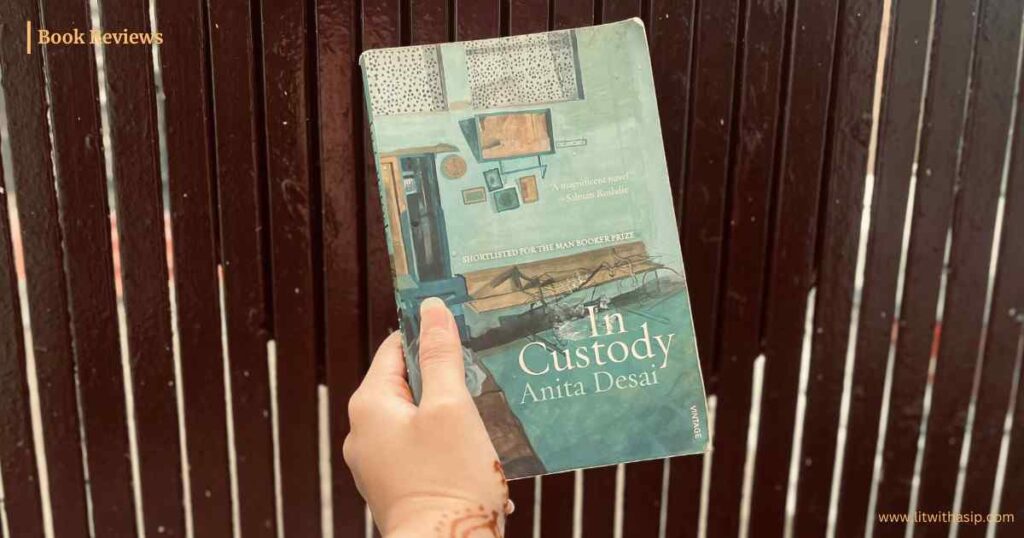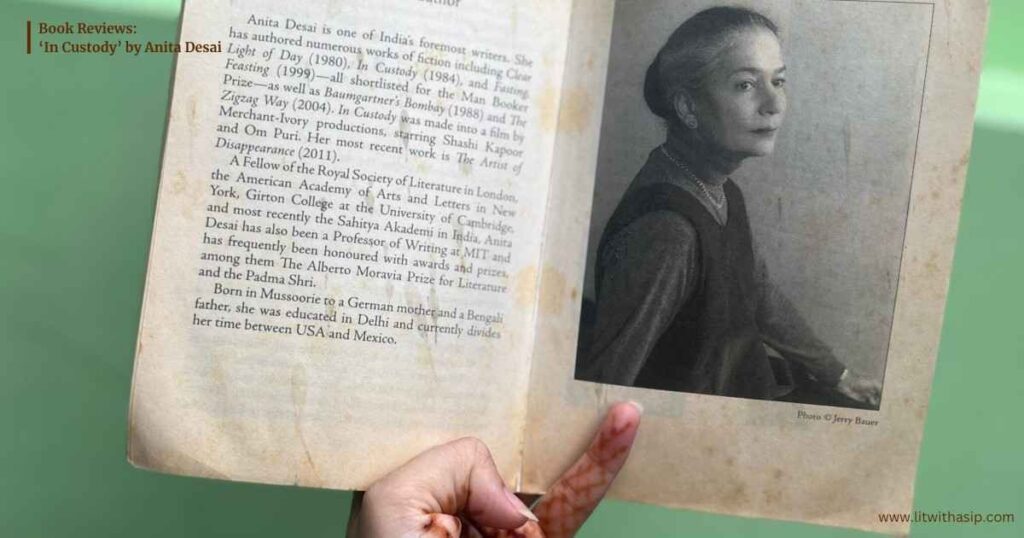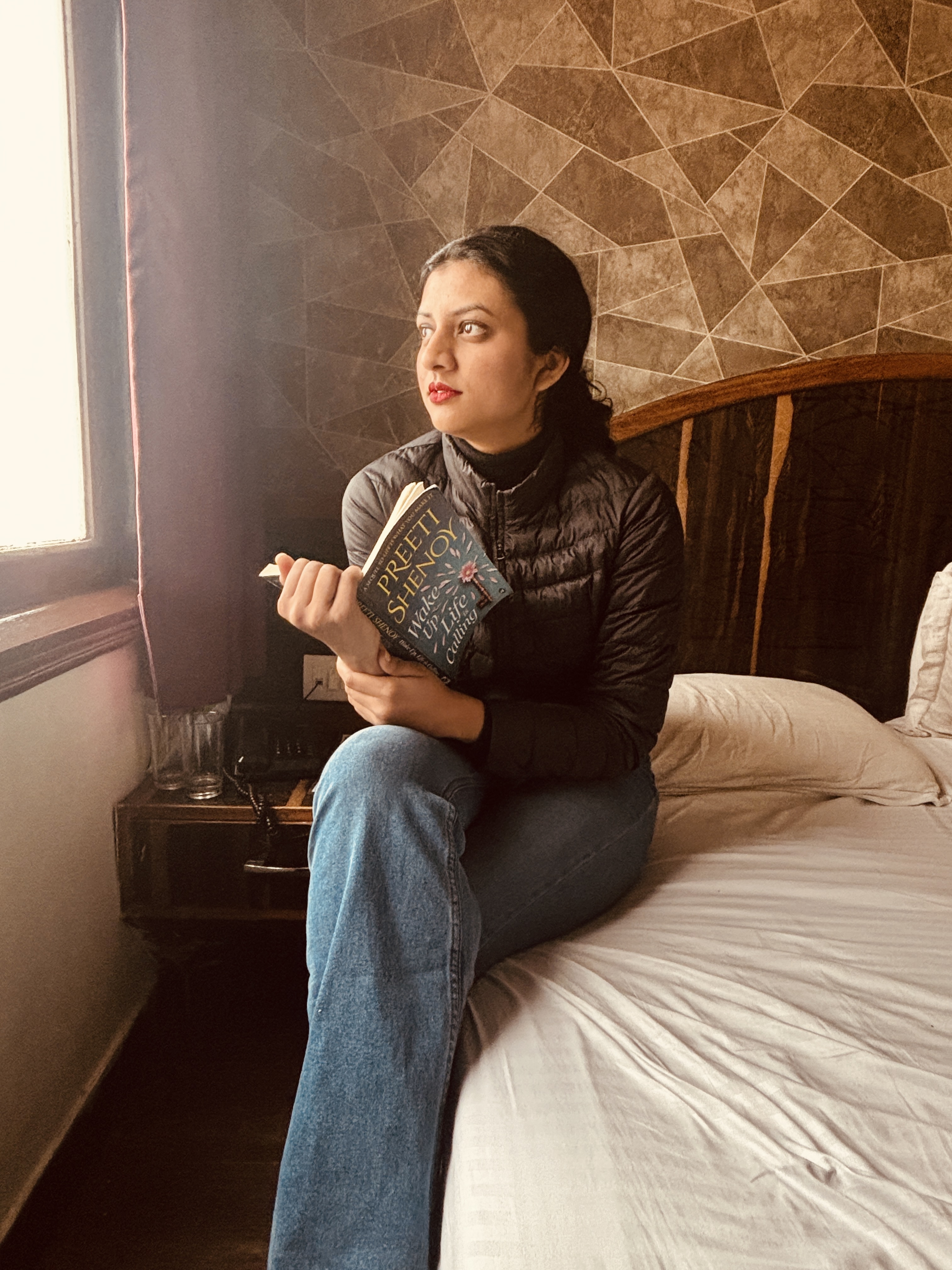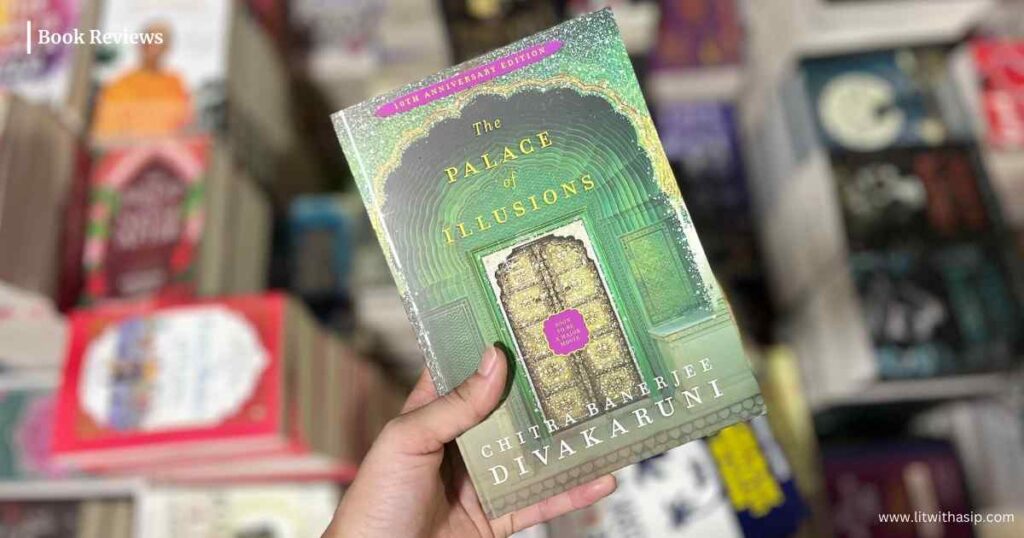
Imagine being stuck in a life you never wanted, dreaming of something grander but feeling powerless to escape the dullness of everyday existence. That’s where Anita Desai’s 1984 novel ‘In Custody’ takes you. It’s the story of Deven, a small-town Hindi professor with a passion for Urdu poetry, who gets the chance of a lifetime to interview a famous poet he admires named Nur. Instead of finding inspiration and beauty, Deven’s journey exposes the disillusionment, frustrations, and harsh realities behind his dreams. Desai’s novel is a quietly powerful exploration of disappointment, cultural decay, and the burden of unrealized ambitions.
The novel is highly recognised in literary as well as academic circles. It was shortlisted for the prestigious Booker Prize in 1984, which significantly raised its profile. Salman Rushdie has called the novel ‘magnificent’ and it has earned its praise for exploring themes like linguistic and cultural decay, personal failure, and the clash between dreams and reality. Desai’s sharp characterization and insightful portrayal of small-town India have made the book a staple in discussions of postcolonial and Indian literature.
It has also been adapted into a film by renowned director Ismail Merchant in 1993, further increasing its visibility and recognition. Evoking the feeling that someone is caught between cultures, let us understand why this book deserves to be your next read…
The Writing Style And Setting
The writing style in the novel ‘In Custody’ is rich, descriptive, and layered with emotional depth. Desai has masterfully used a blend of realism and introspection to capture the inner turmoil of her characters. The story takes place primarily in the small, dusty town of Mirpore, which reflects the stagnation and limitations faced by the protagonist, Deven. Mirpore, with its modest college and uninspiring surroundings, symbolizes the mediocrity and confinement that trap Deven in his unfulfilled life. It is sharply contrasting with the world of Urdu poetry and associated grand culture that Deven idealizes.
The setting shifts when Deven visits Nur, a once very famous Urdu poet. He lives in Chandni Chowk, a historic area in Old Delhi endowed with bustling life, labyrinthine streets and vibrant atmosphere. However, Nur’s residence in this area is quite dilapidated and pretty neglected, which is ironic to what Deven perceived. Desai’s attention to detail brings the settings vividly to life, from the dusty classrooms where Deven teaches to the decaying grandeur of Nur’s world. The language she uses feels intimate as well as weighty, making the reader feel Deven’s struggles and disillusionment.
The tone of the novel is not only ironic but also melancholic. It carries an underlying sharpness that exposes the gap between ideals and reality. Her dialogue, too, reflects this balance, with exchanges that can feel heavy with unspoken tensions, but also reveal a tragic humor in the characters’ interactions. This short read can substantiate one’s view on Indian cultural and linguistic dynamics, reflecting how the consequences of language loss are taking shape in contemporary India.
Thematic Concerns
‘In Custody’ explores several thematic concerns, described as follows:
- Cultural Decay and Preservation
The decay of Nur’s once-celebrated art mirrors the neglect and fading significance of Urdu itself, highlighting the tension between maintaining cultural legacies and adapting to modern realities. Deven’s struggle to connect with the aging poet Nur reflects the challenges of preserving cultural traditions in a rapidly changing society. Therefore, the declining importance of Urdu poetry is not just the fall of any language, but of the cultural and linguistic heritage altogether.
Additionally, there was a time when Hindi and Urdu were like intertwined sisters, evolving together, with overlapping vocabulary and literary traditions that bridged communities. However, as seen in contemporary Bharat (India), they have increasingly diverged due to political, cultural, and social factors. The once-close relationship has become strained.
But it’s worth considering whether Hindi and Urdu have truly separated. I would say that despite the political and geographical divide between India and Pakistan, the languages remain slightly intertwined and are used in a blended manner across both nations. This ongoing fusion reflects the rich cultural past of undivided India, which continues to influence and manifest through language, even if it is not as prominent today.
- Disillusionment and Failure
The theme of disillusionment permeates the novel, as Deven’s idealistic dreams clash with the harsh realities of his life. His pursuit of a grand literary experience becomes a journey marked by disappointment, reflecting broader themes of personal and professional failure. Deven’s inability to reconcile his aspirations with his actual experiences underscores the novel’s exploration of the gap between dreams and reality.
Even Nur’s dreams of reclaiming his past glory and revitalizing Urdu poetry are thwarted by the stark reality of his diminished status and the cultural decline around him. His health and poetic abilities are seen deteriorating, wherein his acceptance of ending fame is marked by a sense of resignation and defeat. This contrast between the idealized vision and the harsh truth amplifies the novel’s critique of unfulfilled ambitions and the often disheartening nature of pursuing one’s dreams.
- Socio-economic Constraints
The book also delves into the constraints imposed by socioeconomic conditions. Deven’s small-town existence and limited opportunities highlight the impact of economic and social limitations on personal growth and ambitions. Also, his position in a small-town college highlights the limited resources and opportunities available in less affluent educational institutions. Such an environment contributes to his professional stagnation and underscores real disparity. This scenario in comparison to the once-glorious world of Urdu poetry underscores how societal and economic factors restrict individuals’ potential and shape their experiences. Nur’s resignation is not just because of his deteriorating health but also because Urdu is not as renowned as it was in the earlier times.

Critiques And Debates
‘In Custody’ depicts Urdu poetry’s decline very particularly and may romanticize the past too. However, critics argue that it might overlook the complexities of cultural change, such that the book highlights the loss of a rich literary tradition, but doesn’t fully address the reasons behind this decline. As a reader, one could only trace it back to how things might have been complicated because of the partition and the following gradual loss of language.
Deven’s character is often praised for his depth, but some readers find him ‘frustratingly passive’ and ‘detached’, which might make it hard to relate with him. Similarly, Nur’s portrayal as a once-great poet now in decline has been critiqued for its potential to perpetuate a romanticized image of the struggling artist, rather than offering a more nuanced perspective.
We see the characters struggling through socio-economic barriers, but critics have argued that the portrayal of these challenges might be oversimplified. Also, it is often judged whether the novel adequately addresses the complex interplay between language, politics, and identity, or if it presents just a straightforward narrative of loss.
Notably, some readers find the novel’s pacing slow and its plot development meandering. The focus on internal character struggles and philosophical reflections may be seen as detracting from a more dynamic or plot-driven narrative, leading to mixed opinions about the book’s overall engagement and impact.
Concluding Notes
Just like its title ‘In Custody’, the book signifies the confinement and control experienced by the characters within their own lives and cultural contexts. It reflects their entrapment by societal expectations, personal failures, and the decline of a language once-celebrated. This illustrates the broader theme of being held captive by circumstances beyond control.
People who like contemporary literary fiction, character-driven narratives, and explorations of cultural decline are recommended to give this one a read. Also, if you are someone rooting out for insights into the intersection of personal ambition and cultural heritage, you might find this book highly intriguing.
It would leave you with questions like:
- How do personal ambitions clash with cultural and societal constraints?
- What role does economic and social status play in shaping one’s opportunities and identity?
- In what ways does the decline of a cultural tradition reflect broader societal changes?
You can find or purchase ‘In Custody’ in bookstores, at online retailers like Amazon, and in digital formats on platforms such as Kindle and audiobook services. Happy Reading!

Jennis Jacob, a passionate literary enthusiast in her 20s, is a writer and poet. With eight years of experience in literature, she is currently a master in English and finds inspiration in Womanist, American, and Indian Partition Literatures. Her works have appeared in anthologies such as ‘Carved Words Of Creative Minds’ and ‘100 Splendid Voices,’ and she is working on upcoming books. Through LitWithASip, she aims to ignite a love for literature and empower individuals to embrace their true selves.


No matter if some one searches for his necessary thing, so
he/she desires to be available that in detail, therefore that thing is
maintained over here.
I am glad to be one of several visitants on this great internet site (:, thankyou for putting up.